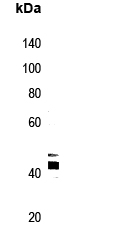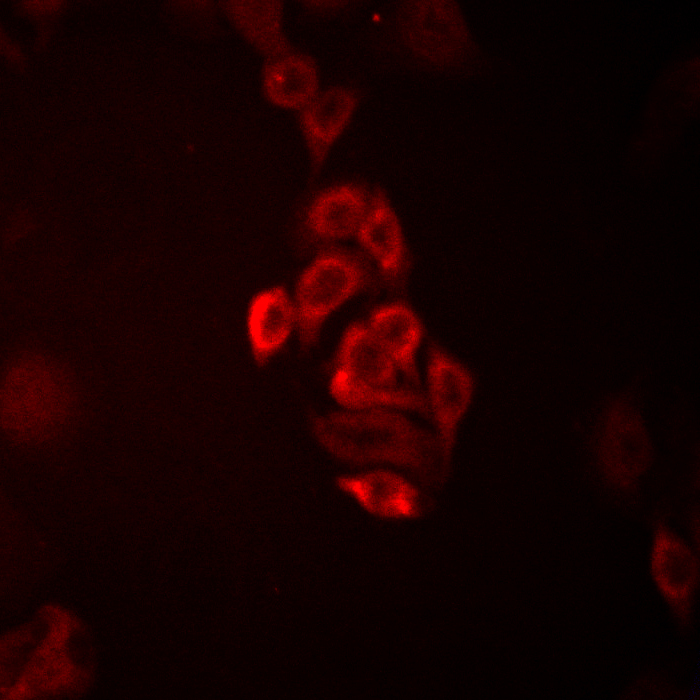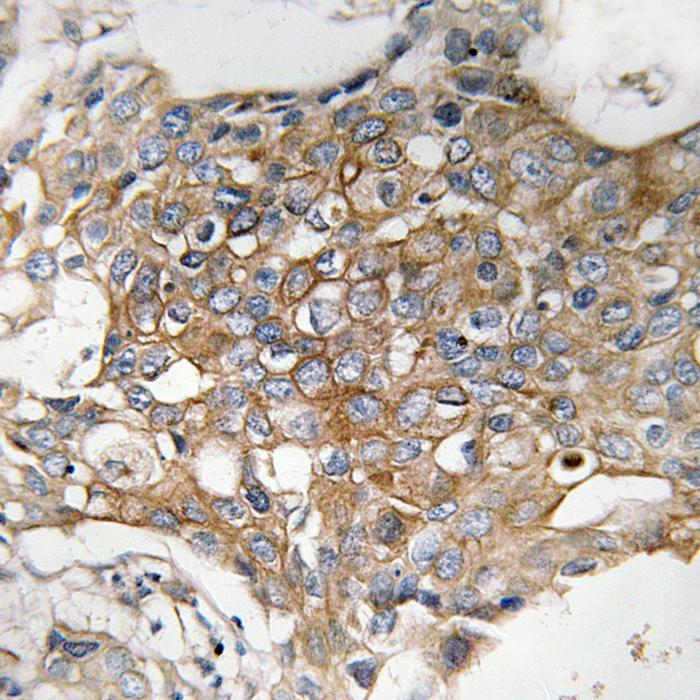


| WB | 咨询技术 | Human,Mouse,Rat |
| IF | 咨询技术 | Human,Mouse,Rat |
| IHC | 1/50-1/100 | Human,Mouse,Rat |
| ICC | 1/100-1/300 | Human,Mouse,Rat |
| FCM | 咨询技术 | Human,Mouse,Rat |
| Elisa | 咨询技术 | Human,Mouse,Rat |
| Aliases | CXorf13; FAM11A; Transmembrane protein 185A; Protein FAM11A |
| Entrez GeneID | 84548; |
| WB Predicted band size | 41kDa |
| Host/Isotype | Rabbit IgG |
| Antibody Type | Primary antibody |
| Storage | Store at 4°C short term. Aliquot and store at -20°C long term. Avoid freeze/thaw cycles. |
| Species Reactivity | Human,Mouse |
| Immunogen | KLH-conjugated synthetic peptide encompassing a sequence within the C-term region of human TMEM185A. |
| Formulation | Purified antibody in PBS with 0.05% sodium azide. |
+ +
以下是关于FAM11A抗体的3篇参考文献及其摘要内容:
---
1. **文献名称**: *FAM11A interacts with HPV E7蛋白 to promote cervical cancer progression*
**作者**: Liu Y, et al.
**摘要**: 本研究利用FAM11A特异性抗体进行免疫共沉淀(Co-IP)和Western blot分析,发现FAM11A与人乳头瘤病毒(HPV)致癌蛋白E7直接结合,通过调控细胞周期蛋白加速宫颈癌细胞增殖。抗体的应用证实了FAM11A在宫颈癌组织中的高表达。
---
2. **文献名称**: *FAM11A modulates DNA repair via USP7-mediated deubiquitination*
**作者**: Chen X, et al.
**摘要**: 通过免疫荧光和免疫组化实验(使用FAM11A抗体),研究揭示了FAM11A在DNA损伤修复中的作用。结果表明,FAM11A通过招募去泛素化酶USP7稳定靶蛋白,促进肿瘤细胞对化疗的抵抗性。
---
3. **文献名称**: *FAM11A is a cell cycle-regulated protein essential for mitotic entry*
**作者**: Wang H, et al.
**摘要**: 该研究使用FAM11A抗体进行细胞周期同步化实验,发现FAM11A在G1/S期表达升高,并通过磷酸化调控CDK2活性,影响有丝分裂进程。抗体特异性验证表明其在多种癌细胞系中具有高灵敏度。
---
**备注**:若需获取具体文献,建议在PubMed或Google Scholar中通过标题/作者名检索,部分研究可能涉及抗体应用但不一定在标题中直接体现。
The FAM11A (Family with Sequence Similarity 11 Member A) protein, encoded by the FAM11A gene, is a poorly characterized protein with limited functional information available in current literature. It is ubiquitously expressed in human tissues, with higher levels observed in the testis, brain, and lymphoid organs. Structural analyses suggest it contains putative nuclear localization signals, hinting at potential roles in nuclear processes. Emerging studies associate FAM11A with cellular proliferation and cancer progression, particularly in breast and ovarian cancers, where its overexpression correlates with poor prognosis.
FAM11A antibodies are primarily utilized as research tools to investigate the protein's localization, expression patterns, and molecular interactions. Commercial antibodies are typically developed against specific epitopes, often targeting the N-terminal region (e.g., amino acids 1-150). These antibodies enable applications such as Western blotting, immunohistochemistry, and immunofluorescence. Validation remains challenging due to the lack of well-established biological functions and interacting partners. Recent proteomic studies suggest potential involvement in DNA damage response pathways, though mechanistic details require further exploration. As research progresses, FAM11A antibodies may gain importance in elucidating its role in cellular homeostasis and disease pathogenesis.
×